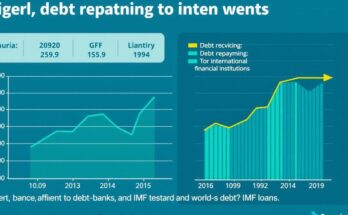The Maldives is facing a severe debt crisis with total debt rising from USD 3 billion in 2018 to USD 8.2 billion in 2024, projected to exceed USD 11 billion by 2029. External debt repayment obligations are daunting, with USD 600 million due in 2025 and USD 1 billion in 2026. The China-Maldives Free Trade Agreement has worsened economic vulnerabilities, prompting urgent calls for international intervention to avert potential sovereign default.
The Maldives is currently confronting a severe debt crisis, jeopardizing its economic sovereignty as foreign exchange reserves dwindle. The nation’s total debt has surged from USD 3 billion in 2018 to USD 8.2 billion as of March 2024, with projections forecasting it will exceed USD 11 billion by 2029. Of the current debt, USD 3.4 billion is attributed to external sources, primarily from China and India, impacting the Maldives’ financial future significantly.
The immediate financial obligations are daunting, particularly with external debt repayments of USD 600 million due in 2025 and an astonishing USD 1 billion in 2026. The usable foreign exchange reserves held by the Maldives Monetary Authority fell below USD 65 million as of December 2024, although they had improved from a critical low of USD 21.97 million in July. Notably, reserves reached negative values in mid-August, highlighting a severe balance of payments crisis.
In light of these challenges, the Maldives has faced downgrades in its credit rating from international financial institutions. Fitch Ratings reduced the Maldives’ rating by three notches in June and August, and Moody’s has retained a negative outlook for the government’s long-term ratings. Correspondingly, the China-Maldives Free Trade Agreement, enacted in January 2025, has exacerbated the nation’s economic vulnerabilities.
The FTA has led to a substantial imbalance in trade, where Maldivian exports constitute less than 3% of the bilateral trade compared to China’s dominating 97% import share. Under the FTA, tariffs on 91% of goods from China were eliminated, which has resulted in limited reciprocal benefits for the Maldives. For instance, imports from China rose to USD 65 million within the first two months of the FTA, while government revenue from import duties sharply decreased by 64%, highlighting adverse economic impacts.
Additionally, the tourism sector has been impacted as Chinese companies increasingly dominate, directing financial benefits away from local enterprises. In response to the financial crisis, President Muizzu’s administration has raised various taxes and divested stakes in state-owned enterprises to mitigate the economic fallout. Despite efforts, the Maldives is anticipated to experience financing gaps of over USD 500 million in 2025 and USD 800 million in 2026.
Seeking assistance, the Maldives government has requested USD 300 million from Gulf Cooperation Council countries, but responses have been lackluster. Moreover, appeals for USD 200 million from the China Development Bank have not yielded positive outcomes. A currency swap of USD 750 million from India provided temporary relief, yet it remains inadequate for forthcoming debt service payments.
Dimitra Staikou expressed a grave concern that without significant international intervention or debt restructuring, the Maldives risks a fate akin to Sri Lanka’s sovereign default. With limited creditor support, the Maldives is on the brink of a potential economic crisis, which threatens its financial autonomy and political independence, exacerbated further by the existential threat of climate change.
In summary, the Maldives faces a severe debt crisis exacerbated by unmanageable external debt, dwindling foreign exchange reserves, and unfavorable trade agreements, particularly with China. Despite multiple efforts by the government to stabilize the economy, substantial financing gaps loom in the near future. The situation warrants urgent international intervention to prevent a descent into sovereign default, which would have dire consequences for the nation’s economic and political stability amid existing climate threats.
Original Source: www.aninews.in




